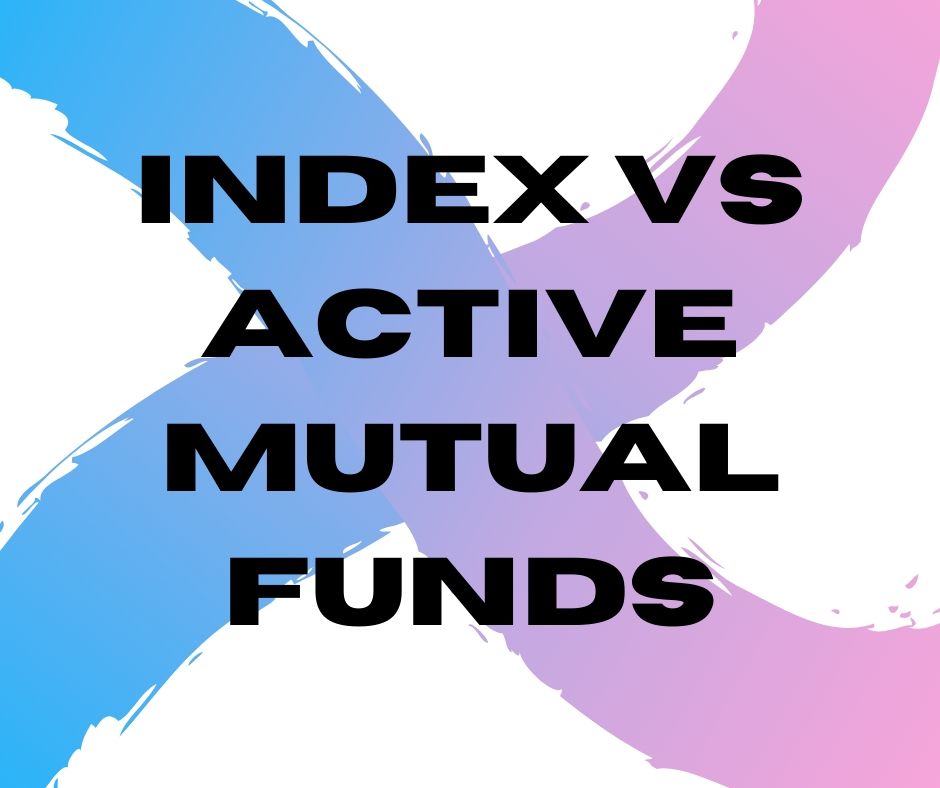Index vs Active Mutual Funds | What to pick ? | Explained !!!!
- 27 April 2020 | 1470 Views | By Mansi Jain

INDEX VS ACTIVE MUTUAL FUNDS
Today investors have a lot of options to choose from for the purpose of investment. If a novice in the investment sector is looking to invest in the stock market they consider investing in mutual fund schemes. Mutual funds are categorised into Active funds and Passive Funds.
What are Active Mutual Funds ?
The first category is active mutual funds often referred as actively managed funds. It is a set of funds in which the decision to invest the money lies with an investment manager or a fund manager. Active research and brainstorming are done to carefully pick profitable investments that can outperform the fund’s specified benchmark or index. Fee charged for these funds is relatively higher as compared to the fee charged for passive funds because fund managers actively buy, hold and sell stocks along with researchers and analysts.
What are Index funds?
The second category is index fund. It is a passive type of mutual fund with a portfolio constructed to match or track the components of a financial market index, such as S&P BSE Sensex which is an index of stock of 30 companies commonly known as Sensex, NSE Nifty50 which is an index of stock of 50 companies commonly referred as Nifty. An index fund is considered as the most efficient investment scheme because they are simple to understand and can be a starting point for an investment journey. In addition, these funds are available at a lower cost and are more tax efficient as compared to other actively managed funds. It also helps in eliminating individual biases.
Index vs Active Mutual Funds
If we compare the above two categories, index funds are more popular than the active mutual funds. This is mainly because they promise ownership of a wide variety of stocks and diversification along with a lower risk.
For example, one share of an index fund may provide ownership to hundreds of companies. While some funds allow us to own stocks across industries, other funds allow exposure to a specific industry or a country.
Apart from the above factors that help us distinguish between the two, there are three main differences between index funds and active mutual. They are:
- How decisions are made about a fund’s holding (active or passive)
- The goals of the fund.
- The cost of investing in each fund.
Let us discuss the above factors in more detail.
What are the advantages and disadvantages of buying Index Mutual funds rather than actively managed funds?
The index fund is not actively managed by a fund manager due to which it aims to buy and hold the securities that comes under the indices they are part of such as S&P BSE Sensex of Nifty50. Also, there is no need to buy and sell securities regularly and the fund’s performance is completely based on the prices of the fund itself. While, the performance of an actively managed mutual fund is based on the investment decision of the fund manager.
There is a constant debate on which one is the best between the two is a hot topic in investors and investment managers across the world. Although, the market is quite unpredictable and has experienced fluctuations in the last few years, it does not imply that active funds are better performing funds.
Each type of fund offers a different investment objective, like the major goal of an index fund is to create a mirror image of the performance of an index while an active mutual fund offers to outperform the market. Investing in actively managed funds, the investments are strategically selected so that they yield a higher return than average returns. This leads to a higher cost which is the next big difference between the two.
As the cost of managing an active mutual fund is more than the cost of managing an index fund, it leads to a higher cost for an investor in terms of investment fee.

There are various costs involved in managing an active mutual fund such as the salary of a fund manager, bonus, marketing and other operational costs which are usually charged to the investors as mutual fund expense ratio or fees.
Merits and Demerits
Above we have discussed the type of mutual funds and the difference between an index fund and an active mutual fund. This leads us to question the advantages and disadvantages of investing in an index fund and active mutual fund.
Risk
One of the main advantages of investing in an index fund is that it offers steady and long-term growth with relatively low risk options for investing in stocks and bonds. An index is represented by many different sectors making it inherently diversified. Also, in the last few years index funds have often performed better than actively managed funds.
Cost Effective
Another advantage of index funds is that it is cost effective because of its lower fees for investors as compared to the fees of active mutual funds. The index funds are more passively traded because they stick to an index.
There are many tax advantages as well if one invests in Index Funds or Passively traded funds. As these funds are passively managed they have a lower turnover, which means that the trades done in the funds are less during a year that leads to less capital gains. Also, if one invests in Equity linked Savings Scheme it helps in tax savings and other benefits.
Disadvantages
Other than these benefits there are quite several disadvantages for investing in index funds. One of the major disadvantages is lack of flexibility. Investing in index funds requires the fund managers to adhere to strategies and policies and try that index funds can perform even when there is a limited option available. Index funds managers don’t have many options to limit the losses in case the returns of an index fund are strongly declining. In contrast, the fund managers of active mutual funds have more flexibility to find better options in good or bad times.
If an index fund does not accurately track its benchmark index, then there will be a difference in the return to the investor and the benchmark return. This also means that index funds do not give its investors a possibility of massive gains. The top performing active mutual funds may outperform the top performing index funds in a year. However, the top performing active funds vary from year to year, so the underperforming years can cancel out the overperforming ones, while index funds performance is steady.
Bottom Line
There is no agreed upon time to invest in index funds but ideally, we should try to invest in the market when it is low and sell when it is high. At this point of time investing in index funds could be a good option. Due to fast spread of coronavirus and subsequent lockdowns, equity markets have already faced the biggest crash. However, each crash is followed by a vigorous recovery within 3-5 years. Index funds are less risky funds as compared to active funds, but it is also subject to the market’s ups and downs. So before investing in the index funds it will be a better idea to do a research on the investments and index you are planning to put in your money.









